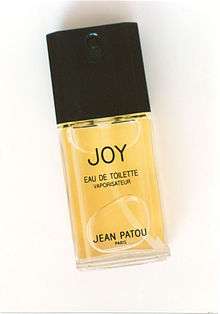Joy (perfume)
| Joy by Jean Patou | |
|---|---|
 | |
| Fragrance by Jean Patou | |
| Type | Women's fragrance |
| Released | 1929 |
| Label | Patou |
Joy is a perfume created for Parisian couturier Jean Patou by perfumer Henri Alméras in 1929. It is considered to be one of the greatest fragrances created and is a landmark example of the floral genre in perfumery.[1]
History
Joy was created as a reaction to the 1929 Wall Street crash, which had diminished the fortunes of Jean Patou's wealthy American clientele. Despite its elevated price and the depressed economic environment, Joy became a success and has remained Jean Patou's most famous fragrance. In 2002, the House of Jean Patou created Enjoy, a contemporary take on Joy meant for younger women.
Composition
Joy is composed primarily of a combination of jasmine and rose; 10,000 jasmine flowers and 28 dozen roses are required to create 30ml of the parfum, contributing to its high retail price.[2]Joy also contains other flowers such as ylang ylang, michelia and tuberose. Given its many ingredients, Joy does not smell like a specific flower. According to Luca Turin, "the whole point of its formula was to achieve the platonic idea of a flower, not one particular earthly manifestation." [3] The bottle was created by French architect and artisan Louis Süe and was designed to have a simple, classical feel.[2]
Awards and honors
"Joy" was voted "Scent of the Century" by the public at the Fragrance Foundation FiFi Awards in 2000, beating its rival "Chanel No. 5".[4]
Joy is preserved in its original 1930 formulation in the archives of the Osmothèque, donated to the collection by Jean Kerléo (formerly head perfumer at Jean Patou).[5]
References
- ↑ Fragrantica.com Team. "Joy Jean Patou Perfume". fragrantica.com]. Retrieved 2008-05-07.
- 1 2 "Creating Joy". Jean Patou. Retrieved 2009-09-28.
- ↑ Turin, Luca; Tania Sanchez (2008). Perfumes: the guide. New York, New York: Viking. ISBN 978-0-670-01865-9.
- ↑ "Great Joy for Patou— Joy, Scent of the Century". Soap Perfumery & Cosmetics. September 2000.
- ↑ Osmothèque - Conservatoire international des parfums. Official website. Web.